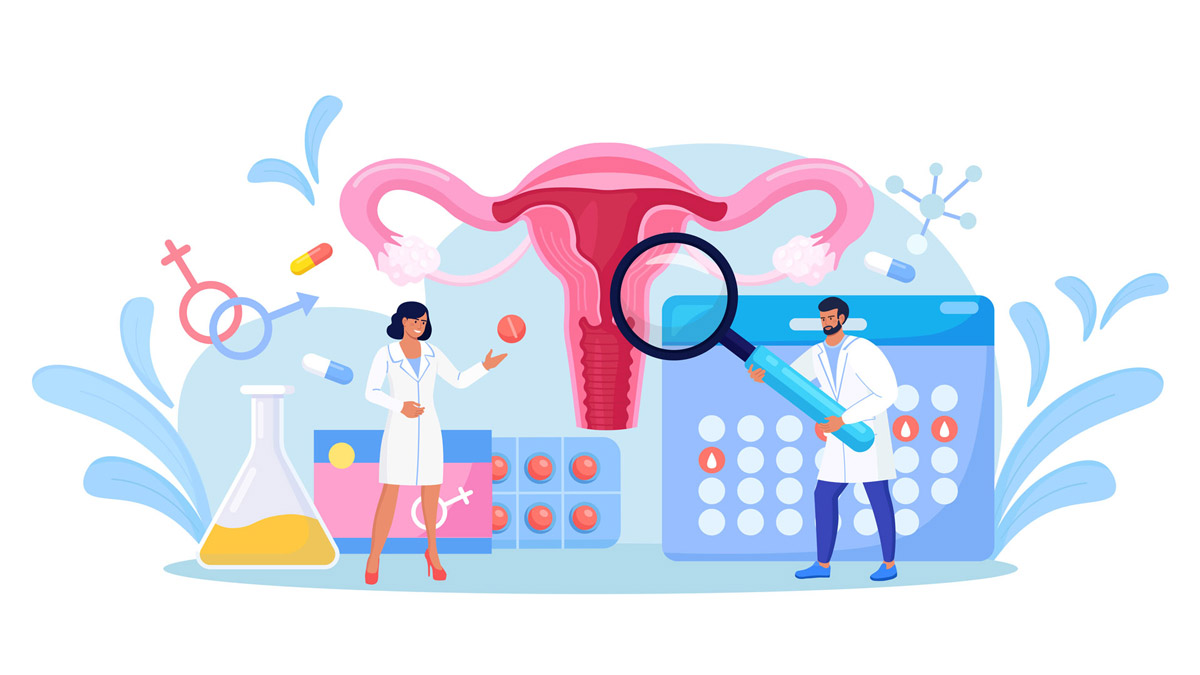- PUBLISHED August 3, 2023
- PUBLISHED August 3, 2023
- It’s considered “normal” if period cramps start messing around a day or two before starting your period. They usually peak about 24 hours after bleeding starts.
- But severe period pains and cramping are not normal – especially if it disrupts your life or if the menstrual pain can’t be eased with common painkillers.
- Also – keep an eye on bad menstrual cramps that come with heavy and long periods, bigger blood clots and prolonged bloating. Bundled symptoms may point to a more serious condition, such as endometriosis.
- If you worry, don’t wait for the period pain to sort itself out – go and see a doctor.
Unusual menstrual cramping: what could they mean?
Most of you know all too well when you are starting your period each month. Cramping, migraines, bloated belly – as you go through your period days, discomfort, grumpiness, soreness is often a recurring theme.
It’s tough to say what level of period pain is still considered normal, but doctors can confidently say what’s not. “If periods interfere with your daily life and make you suffer, they are not normal,” says Dr. Miriam S. Mottl, a gynaecologist and sex therapist.
Debilitating and extreme period pain symptoms are a grim monthly reality for many – up to twenty percent endure period pain that disrupt their daily lives, according to one scientific review. 1
The concern is that long painful periods, also known as dysmenorrhea, is not always a result of uterus contractions during regular periods. Bad period pain could point to a health condition that needs to be diagnosed and treated. Most common disorders are:
- Endometriosis: tissue similar to tissue of the uterus lining grows outside of the uterus
- Adenomyosis: tissue similar to uterus lining tissue grows into the muscle wall
- Uterine fibroids: noncancerous tumors that grow inside the uterus
- Pelvic inflammatory disease: infection of the uterus, fallopian tubes, or ovaries
Bad period pain symptoms don’t necessarily mean something is wrong with you. But you could consider them as a reminder from your body to check in with the gynecologist. Below we list some of the clues that you should especially keep an eye on.

Regular medications don’t do the trick
The good news is that there is a menstrual cramp relief medicine with anti-inflammatory properties on the market. Properties (also known as NSAIDs), such as aspirin and ibuprofen for cramps help ease the period pain in many cases. But they still don’t work for everyone – about 18 percent of people with painful PMS symptoms are unresponsive to NSAIDs. 2
When over-the-counter stuff is not useful, doctors might prescribe stronger versions of the painkillers. But the source of the pain is a certain underlying condition, painkillers will just mask the pain. We encourage you to talk to your doctor about other treatment strategies.
Your daily life suffers
Henriette, a 30-year-old Berliner, describes her period pain episodes as downright hell. “When I get my period, I don’t sleep, I feel worn out. Sometimes, I can hardly stand on my feet. In the worst cases, you’ll find me squirming on the bathroom door,” she recalls.
She is not alone. Period pain disrupts the daily activities of up to 20 percent of women+, according to a 2012 study by the American Academy of Family Physicians. 3 Most also say that menstrual pain affects work productivity. 4
The culture of silent suffering is unfortunately rampant. Only 20 percent of women+ with dysmenorrhea, for example, will tell their bosses the real reason why they feel unwell. Almost half mentioned a general symptom like cramping and the rest either gave no reason or made something up, a Dutch study found out. 5 According to another survey by the same authors, 38 percent of all women+ said they are not able to perform all their regular daily activities during menstruation. 6
Periods are not fun, but they shouldn’t make your life miserable or stop you from living. Talk to your friends and family about how periods affect your health, and above all, let your doctor know – together you’ll find a way to best manage the menstrual pain.
Cramps come with heavy and long bleeding
A heavy period and pain can be messy and unpleasant. You also may have a more intensive flow at some point. One in three women+ describe their period as heavy and one in twenty women+ consult their doctor every year about it. 7
The yardstick for heavy bleeding being diagnosed as such by doctors is more than 80ml of blood or four tablespoons during the entire period. 8 This amount corresponds with having to change the blood-soaked tampon every hour or two. Other signs to watch out for include: 9
- waking up to change sanitary protection during the night,
- restricted daily activities
- symptoms of anemia, such as tiredness, fatigue or shortness of breath.
The length of your period is also something to keep an eye on. Periods are considered normal if they last between two and six days. If bleeding goes on more than seven days, have it checked out.
Heavy periods are not necessarily a reason for concern. In about half of cases, heavy menstrual bleeding turns out to be just that and no medical reason that causes them can be found. In some cases, however, there is and the most common are:
- Changes to your hormones or ovulation
- Certain medications, including hormonal contraceptives, blood thinners and NSAIDs
- Uterine-related problems (fibroids, polyps, cancer, miscarriage)
- Adenomyosis – a condition when glands from the endometrium become embedded in the uterine muscle
- Other medical conditions, including liver or kidney disease
If you dread your unusually bloody and long periods, it’s important to get your symptoms checked out. Doctors may do a blood or pap test, endometrial biopsy or use an ultrasound to better understand the causes.

You get menstrual cramps but no period
Monster cramps, bloating, tiredness… you’ve ticked off all the points from the period checklist. The period, however, isn’t always to blame for the pain that radiates around your pelvic area – there’s a lot going on there.
Here are just some of the causes that could make you feel like your monthly visitor is about to stop by:
- Pregnancy
- Ovulation
- Stress
- Hormonal birth control
- Adenomyosis
- Appendicitis
- Painful bladder syndrome
- Bowel issues
It is sometimes tough to tell what causes non-period cramping. If you’re worried, bring your concerns up with your doctor.
Menstrual cramps just won’t go away
One tell-tale sign of (un)common period pain is also the length of your menses cramps. Usually, cramps start messing around a day or two before your period, peaking 24 hours after bleeding starts. They typically last for two or three days. Anything longer is not considered normal – especially not if cramps continue after your period ends.
Other clues you should keep an eye on
Menstrual cramps are not the only sign that periods could be a bit off. Other symptoms may include:
Bigger blood clots during period
Blood clots during your period are usually normal and necessary. But sometimes they can indicate that something isn’t quite right. “Clots, the size of a cherry, are not necessarily problematic, but any larger blood clots during period is not normal,” Dr. Mottl explains. Also, pay close attention to how frequently you shed clots and if they come with a heavy flow. Larger blood clots during your period could point to our usual culprits – uterine fibroids, endometriosis, adenomyosis or hormonal imbalances. 10
Spotting and non-menstrual bleeding
Some of you may bleed before or after the menstruation. This bleeding can range from light brown spots in the undies to a heavy flow resembling a regular period.
There are a number of reasons for non-scheduled bleeding: low progesterone levels, hormonal contraceptives, stress, sex or pregnancy, also endometriosis, fibroids or ovarian cancer.
Bleeding or spotting outside your menstruation calendar can understandably put you a little on edge. “My suggestion is that you go to the gynaecologist. Do the same if you start taking contraception pills and the period changes. If you’re unsure about any of this, ask your doctor,« Dr. Mottl suggests.
Prolonged bloating
Menstrual bloating usually isn’t a cause for concern. It is annoying as hell, though! Fight it with the right food – green veggies, fruits, nuts – and drink plenty of water. Persistent bloating, especially if it seems unrelated to your period, could produce a red flag pointing to a more severe health condition if it drags on for more than three days.

Always advocate for your health
If you’re worried your periods are not normal or if they suddenly change, you should take it seriously. Painful, or otherwise “different”, periods can be a body’s way of telling you that something is not ok.
Many people, however, are afraid to talk to their doctors about symptoms that can’t easily be diagnosed. It is true that not all gynaecologists are alike, some might say that you just “have to accept” the pain. But don’t accept it, rather inform yourself about different options and advocate for your health all the way!


